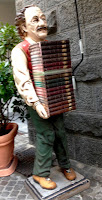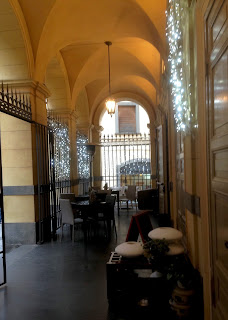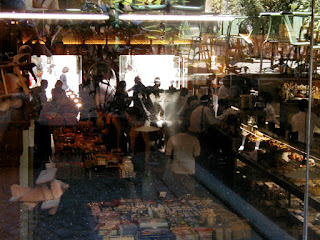Lunch at home, and now a walk to the bar for a macchiato and a dolce.
I round the corner on Via Pecorelli, and look for the black and white cat. She’s a hefty one and meows as soon as soon as she sees me. Her son is smaller and usually runs away, but they look so much alike that it takes me a moment to know who I’m dealing with. Today, it’s the son… and he runs away.
She and I have a thing. I pet her and she purrs furiously, meows, and rubs her head on whatever she can reach, which (because she is often on top of a parked car) is, endearingly, my nose. It’s a little embarrassing, right out on the street like that. I keep it going for as long as I’m able. She always looks bewildered when I move on.
In the first piazza I come to is a beautiful woman of about thirty-five, standing, waiting, with her beautiful child in a stroller. The wind dances around both. Everything glistens.
Under the archway a couple shelters with their child, stroller – rain, wind. He shakes the water from his face as I pass.
In the larger piazza the little wooden huts put up by CittaSlow are still in place. I check to see that the cheese stand and pasta stand are open. They are. I’ll stop on my way back. The crowds are gone but there are people out. Someone is selling oranges, brilliant and huge and golden, on the steps of Sant’Andrea. Four crates of them sit pondering the chill weather, so unfamiliar to their Sicilian roots. Next to them, a woman in a hood looks unhappily out across the piazza; rain is not her element, either.
Through the second arch. I wave at someone, I don’t remember who, and turn towards good coffee and good company at Blue Bar. The bar has been open Sundays for a couple of weeks, now. Sunday is their torno, their closed day, but the holidays and the Festival changed that. Today their blinds are snugly drawn and the sign that says “Aperto Open Ouvert” still taped to the outside of the glass, curls in the rain.
I turn around. My second choice is Bar Montanucci. Second, not because it’s less good, but because they’ll probably be overwhelmed by a lunch crowd. They are. I order a caffè macchiato. She smiles weakly. Several lunches are served. I order a dolce from the serene lady at the pastry case; lunches are easier for her. Another server notices me between meals and I’m brought an espresso. I ask for milk. She nods, harried, but the milk is poured with perfect foam and in just the right amount, and I take both coffee and dolce down several steps into the lower room.
The dolce is one of their buttery, flakey pastries that form a nest for a piece of baked fruit. The pastry that holds a half pear is in the shape of a pear. The pastry even forms a leaf and stem. Likewise for the apple, which is thinly sliced. The peach is as plump as a sunset.
Back in the piazza, I buy pasta and cheese at the CittaSlow huts. Everyone is charming. We sigh as we contemplate today, Epifania, as the end of this season’s mercatino, but from them I detect a bit of relief, too.
Walking down Corso, not as many languages are heard, no photos are being taken, fewer families stroll their infants than yesterday, but it’s still festive. Tomorrow begins what a couple of Orvietani have referred to as la tranquillità; the period between Epiphany and March. In March, the weather begins to warm, and visitors make appearances on other than weekends. In the meantime, we rest.
I pass a little bakery where the woman anxious about the future of her business makes delicious brownies and squares and cupcakes, all from American recipes.
I pass the pen and paper shop where the goods are so beautifully displayed, I hesitate to purchase anything for fear of putting the whole store out of balance. There’s a painted statue of a man in front of the store carrying a pile of books, his legs buckle at the knees.
 I pass Teatro Mancinelli. The cafe is open, and tables and chairs and benches are arranged on the porch. It strikes me as a perfect spot for watching rain. I make a mental note.
I pass Teatro Mancinelli. The cafe is open, and tables and chairs and benches are arranged on the porch. It strikes me as a perfect spot for watching rain. I make a mental note.
Via delle Pertiche Prima is all lit up with Christmas in the middle of the day. I turn onto the street and wonder who organized the neighbors to decorate so lavishly. “Pertiche” refers to a Roman rod, a unit of measure. The street is adorned with rods strung with lights and swags and glittery things, and they go on for at least a hundred meters. I admire any person sufficiently possessed of charm, patience, and initiative to inspire such communal spirit.
As I walk up Passaggiata Confaloniera, I notice the valley is greener than yesterday, and the green is intense. I bend down to examine a fallen twig. It holds six tiny green buds.


